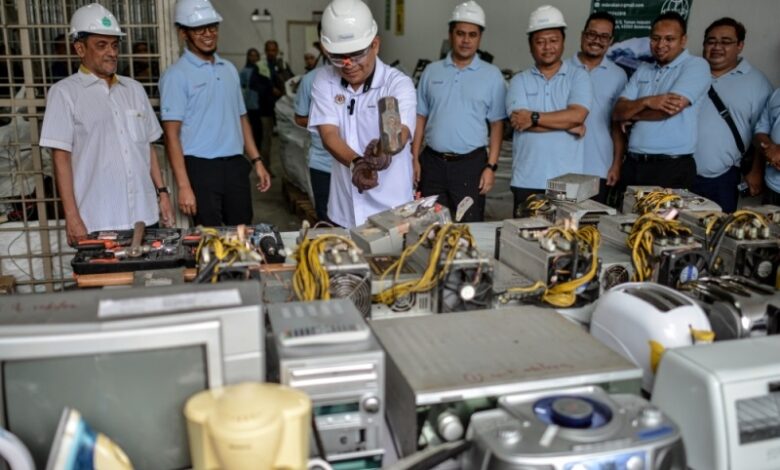Combating Cryptojacking in Malaysia: Can Blockchain Help Regulate Mining?

Malaysia grapples with massive electricity theft due to cryptocurrency mining. Can blockchain technology aid regulation and create a sustainable future for crypto in the region?
Malaysia faces a significant challenge: cryptocurrency mining-induced electricity theft. Malaysia’s Deputy Minister for Energy Transition, Akmal Nasrullah Mohd Nasir, announced that the country has lost approximately RM3.4 billion ($723 million) to electricity theft from 2018 to 2023, primarily due to cryptocurrency mining. This theft poses a significant challenge to the country’s energy sector, impacting both the national power operator Tenaga Nasional Berhad (TNB) and individual consumers.
Government Response and Efforts
The Malaysian government is actively working to bolster its green and renewable energy capacities. This dual approach aims to promote energy sustainability and mitigate substantial losses attributed to illicit mining activities. Akmal Nasrullah emphasized that while cryptocurrency mining itself is legal, the unauthorized use of electricity to power these operations is illegal. Malaysian energy authorities have implemented various measures to monitor high energy consumption and have conducted numerous crackdowns since 2019, resulting in several arrests.
During a recent event in Balakong, Akmal Nasrullah highlighted the government’s vigorous efforts against such illegal practices. Energy companies have conducted 865 raids to investigate electricity theft cases, seizing over 2,000 items, including Bitcoin mining machines and unauthorized electrical equipment valued at around RM2.2 million ($467,000). These items were disposed of in accordance with strict legal and environmental protocols.
In a related development, Malaysia’s Inland Revenue Board (IRB), alongside police and cybersecurity experts, launched ‘Ops Token‘ to target cryptocurrency traders evading taxes. This operation led to raids on ten locations in the Klang Valley region, recovering substantial amounts of unreported profits.
Blockchain and Transparency
Blockchain technology, known for its transparent and traceable transactions, can potentially aid regulatory efforts. By tracking cryptocurrency earned through mining, authorities could identify miners who are not paying taxes. This approach aligns with Malaysia’s recent “Ops Token” initiative targeting tax-evading crypto traders. Blockchain’s transparency can be a powerful tool in monitoring and curbing illegal activities in the crypto mining sector.
Smart Contracts for Sustainable Mining
Beyond transparency, blockchain’s smart contract functionality offers intriguing possibilities. Imagine a system where miners must prove legitimate electricity acquisition before receiving cryptocurrency rewards. Smart contracts can enforce compliance, ensuring that only those who adhere to regulations are rewarded. However, developing and implementing such a system would require collaboration between the government, energy providers, and the cryptocurrency industry.
Monitoring Abnormalities with Heat Maps
To further enhance regulatory efforts, a system to monitor abnormalities in electricity consumption can be implemented. This system would utilize advanced algorithms and blockchain technology to detect unusual patterns in electricity usage associated with cryptojacking. By creating heat maps that highlight areas with abnormal electricity consumption, authorities can quickly identify and investigate suspicious activities. These heat maps would provide real-time data, enabling faster responses and more effective enforcement against illegal mining operations.
Regulation is Key
While blockchain offers potential solutions, robust regulations are crucial. A comprehensive regulatory framework can distinguish between legal and illegal mining activities, ensuring fair competition and sustainability.
- Licensing: A licensing system for cryptocurrency mining operations would establish clear guidelines on energy consumption and waste disposal. This would distinguish legitimate miners from illegal ones, promoting a transparent and fair mining environment.
- Special Tariffs: Creating separate electricity tariffs for licensed miners could incentivize them to operate legally. This would ensure they contribute fairly to the national grid’s upkeep, balancing the energy load and reducing illegal consumption.
The Road to a Sustainable Future
Malaysia’s dual approach of leveraging blockchain’s potential and implementing stricter regulations paves the way for a sustainable future for cryptocurrency mining. Encouraging renewable energy use for mining operations can further reduce the strain on the national grid and promote environmental responsibility. By embracing technological solutions alongside robust regulations, Malaysia can create a framework that fosters responsible mining, protects its energy resources, and positions itself as a leader in the MENA region’s evolving blockchain landscape.




